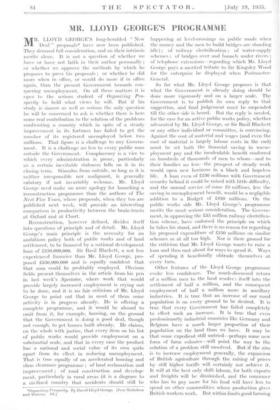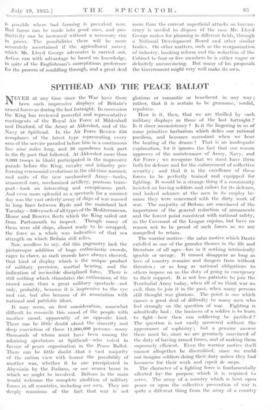MR. LLOYD GEORGE'S PROGRAMME
MR. LLOYD GEORGE'S long-heralded "New Deal" proposals* have now been published. They demand full consideration, and on their intrinsic merits alone. It is not a question of whether we have or have not faith in their author personally ; or whether we approve the methods by which he proposes to press his proposals ; or whether he did more when in office, or would do more if in office again, than the present Government towards con- quering unemployment. On all these matters it is open to the serious student a Organizing Pro- sperity to hold what views he will. But if his study is sincere as well as serious the only question he will be concerned to ask is whether there is here some real contribution to the solution of the problems confronting a country which in spite of a. steady improvement in its fortunes has failed to get the number of its registered unemployed below two millions. That figure is a challenge to any. Govern- ment. It is a challenge no less to every public man outside the Government. Complacency is a vice to which every administration is prone, particularly as a certain inevitable staleness falls on it in its closing term. Stimulus from outside, so long as it is neither irresponsible nor malignant, is generally salutary if not invariably welcome. Mr. Lloyd George need make no more apology for launching a reconstruction programme than the authors of The Next Five Years, whose proposals, when they too are published next week, will provide an interesting comparison in productivity between the brain-trusts at Oxford and at Churt.
Reconstruction, however defined, divides itself into questions of principle and of detail. Mr. Lloyd George's main principle is the necessity for an ambitious policy both of public works and, of land settlement, to be financed by a national development loan of £250,000,000. Sir Basil Blackett, a not less experienced financier than Mr. Lloyd George, pro- posed £350,000,000 and is equally confident that that sum could be profitably employed. Obvious fields present themselves in the article from his pen in last week's Spectator, where work that would 'provide largely increased employment is crying out to be done, and it is no fair criticism of Mr. Lloyd George to point out that in most of' them some activity is in progress already. He is offering a complete programme, and it would be absurd to omit from it, for example, housing, on the. ground that the Government is doing a good deal, though not enough, to get houses built already. He claims, on the whole with justice, that every item on his list of public works would provide employment on a substantial scale, and that in every case the product has a national and social value of its own quite apart from its effect in reducing unemployment. That is true equally of an accelerated housing and slum clearance programme ; of land reclamation and improvement ; of road construction and develop.- ment, particularly in rural areas (it is a disgrace to a civilized country that accidents should still be *Organising Prosperity. By David Lloyd George. (Ivor Nicholson and Watson. 6d.)
happening at level-crossings on public roads when the money and the men to build bridges are standing idle) ; of railway electrification ; of water-supply schemes ; of bridges over and tunnels under rivers ; of telephone extensions—regarding which Mr. Lloyd George pays a merited tribute to Sir Kingsley Wood for the enterprise he displayed when Postmaster- General.
So far what Mr, Lloyd George proposes is that what the Government is already doing should be done more vigorously and on a larger :scale; The Government is to publish its own reply -to, that suggestion, and final judgement must be suspended till the other side is heard. But the reply is needed, for the case for an active public works policy, whether advocated by Mr. Lloyd George, or Sir Basil Blaekett or any other individual or committee, is convincing. Against the cost of material and wages (and even the cost of material is largely labour costs in the end) must be set both the financial saving in unem- ployment pay and the incalculable benefit conferred on hundreds of thousands of men to whom—and to their families no less—the prospect of steady work would open new horizons in a black and hopeless life. A loan even of £250 millions with Government security behind it could be raised with little difficulty, and the annual service of some 20 millions, less the saving in unemployment.benefit, would be a negligible. addition to a Budget of £820 millions. On the public works side Mr. Lloyd George's programme merits the most serious consideration. The Govern- ment, in approving the £35 million railway electrifica- tion scheme, have endorsed the principle on which he takes his stand, and there is no reason for regarding his proposed expenditure of £250 millions on similar schemes as at all too high. Nor is there ground for the criticism that Mr. Lloyd George wants to raise a loan and then cast about for ways to spend it. Ways of spending it beneficially obtrude themselves at every turn.
Other features of the Lloyd George programme evoke less confidence. The much-discussed return of a million men to the land resolve-3 itself into the settlement of half a million, and the consequent employment of half a million more in ancillary industries. It is true that an increase of our rural population is on every ground to be desired. It is true that every Government has failed completely to effect such an increase. It is true that even predominantly industrial countries like Germany and Belgium have a much larger proportion of their population on the land than we have. It may be that some expedient still untried—perhaps some new form of farm colonies—will point the way to the solution Of a problem still unsolved. But if the aim is to increase employment generally, the expansion of British agriculture through the raising of prices by still higher tariffs will certainly not achieve it. It will at the best only shift labour, for both exports and freights will be diminished, and the consumer who has to pay more for his food will have less to spend on other commodities whose production gives British workers work. But within limits good farming possible where bad farming is prevalent now. Bad farms can be made into good ones, - and pro- ductivity can be increased without a necessary rise M prices, • The possibilities there will be more accurately ascertained if the • agricultural survey Which Mr. Lloyd George advocates is carried out. Action can with advantage be based on knowledge, in spite of the Englishman's surreptitious preference for the process of muddling through, and a great deal more than the current superficial attacks on bureau- racy is is needed to dispose M the case Mr. Lloyd George makes for planning in different fields, through a National Development Board and other similar bodies. On other matters, such as the reorganization of industry, banking reform and the reduction of the Cabinet to four or five members he is either vague or definitely unconvincing. But many of his proposals the Government might very well make its own.



























































 Previous page
Previous page